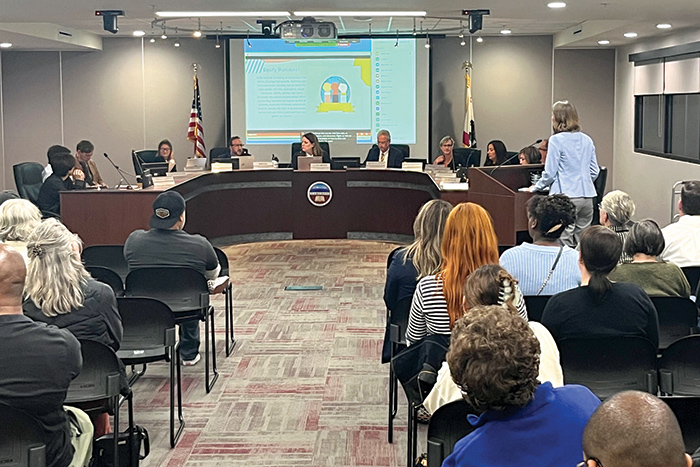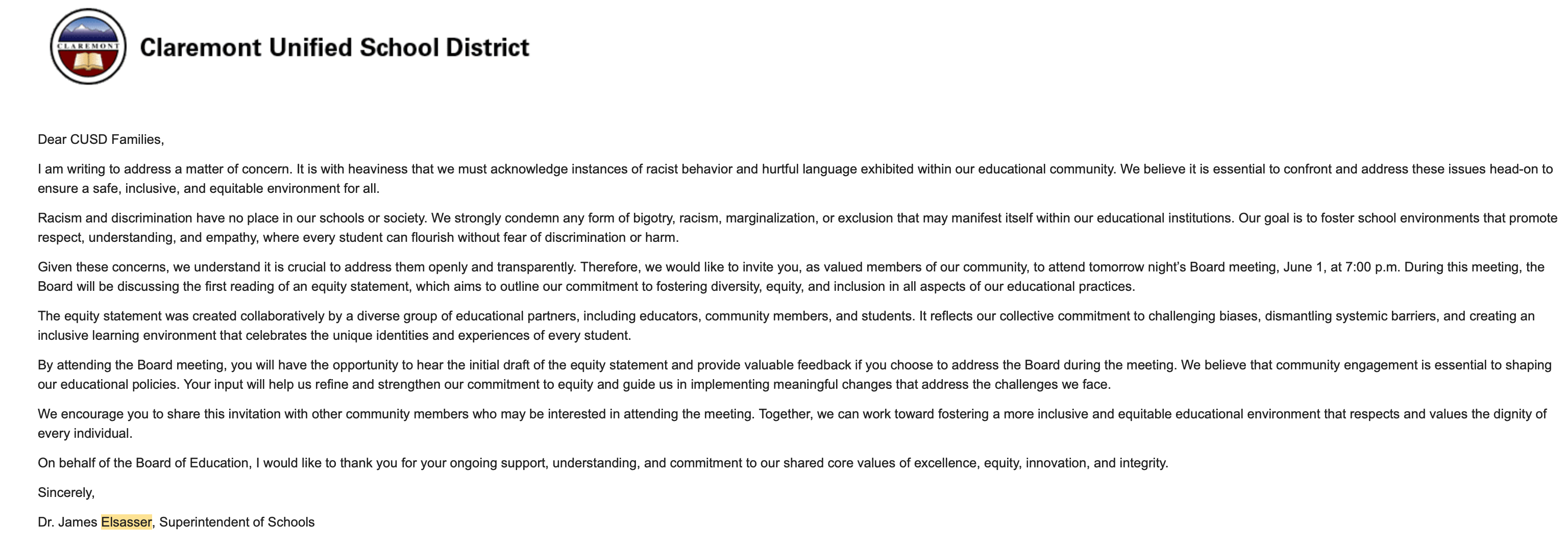Parents allege ongoing racism in Claremont schools, CUSD responds

The CUSD Board of Education, above, hears a report from a member of its equity advisory committee during its June 1 meeting. Photo/by David Kekone
by Steven Felschundneff | steven@claremont-courier.com
Three parents of Black or mixed race students sent a recent letter to Claremont Unified School District’s Board of Education alleging incidents of racism on Claremont public school campuses, including students using vile racial slurs, calling Black pupils “monkeys,” and making racist gestures, including the Nazi salute. The alleged incidents happened on multiple campuses, including elementary schools.
The May 15 letter (viewable at claremont-courier.com) from parents Deborah Kekone, Rolondo Talbott, and Kelsey Robertson expressed alarm that these incidents were taking place across the district and appeared to be happening more frequently. They also listed a range of hurtful experiences their children have endured while in school.
“Students as young as early elementary school have repeatedly been called the ‘n’ word and ‘monkey,’ have witnessed fellow students make racist gestures such as the Nazi salute, and have faced recurring racially-motivated microaggressions,” read the letter. “While fellow parents and their children have expressed that they felt heard and supported when reporting these incidents to teachers and administrators, the conversation always seems to lead to universal concern that there doesn’t seem to be any sort of proactive measures being taken to educate students about and to prevent racism in our schools nor has there been any public-facing communication for parents by the District acknowledging the issue of the growing racism that students are facing.”
Since the letter was sent the trio had a “productive” meeting with CUSD Superintendent Jim Elsasser, Board Vice President Bob Fass and other CUSD officials, including Natalie Taylor, the district’s director of intervention and English learner program.
In a May 31 letter to all CUSD parents, faculty, and employees Elsasser acknowledged the instances of “racist behavior and hurtful language” at the schools. The letter also stated the district’s intention to “confront and address these issues head-on to ensure a safe, inclusive, and equitable environment for all.”

The May 31 letter from CUSD Superintendent Jim Elsasser.
“Racism and discrimination have no place in our schools or society,” Elsasser wrote in the May 31 letter. “We strongly condemn any form of bigotry, racism, marginalization, or exclusion that may manifest itself within our educational institutions. Our goal is to foster school environments that promote respect, understanding, and empathy, where every student can flourish without fear of discrimination or harm.” Elsasser invited the public to attend the June 1 Board of Education meeting, where the panel would be hearing a first reading of an equity statement for the district.
Kekone, Talbott and Robertson followed up their letter by sharing their experiences during public comment at the May 18 board meeting.
“This year was a tough one for my sixth grader,” Robertson said at the May 18 meeting. “My son is biracial and identifies and presents as a Black student. He’s been called a monkey, had monkey noises made at him, had a student bring him monkey erasers, called ‘idiot monkey,’ has been asked to play games for ‘only Black kids’ that included words like slave and cotton picking, and whipping.”
Talbott, who has two children in Claremont schools, said the parents decided to act now because the types of offensive names and images being directed at their offspring were particularly disturbing, and the problem seemed to be growing. After speaking with other parents and seeing posts on social media they concluded it was time to be proactive.
“Los Angeles and San Bernardino Counties have already declared racism a public health crisis and it’s time we treat racism the same way in this school district,” Talbott said on May 18. “This crisis needs action in order to foster healing and resiliency in our children.”
“I understand that taking on racism in a meaningful way is a monumental task, but it is possible, and it needs to be addressed proactively by school districts the way other societal failures like substance abuse, poverty, food insecurity, and violence are,” Kekone added at the May 18 board meeting. “Preventing racism doesn’t need to be something that starts from scratch. Many highly respected agencies and organizations have already made publicly available outlines of comprehensive ways that anti-racist education can be woven throughout the school day of K through 12 students.”
According to Talbott, some of the racist behavior may be learned through online gaming that has exposed very young children to negative stereotyping.
“Once your child shares their experiences of racism, you immediately begin to ‘gaslight’ yourself and your child,” she said. “You come up with narratives that try to explain it away, [such as] ‘Maybe you didn’t hear what was said clearly,’ or, ‘Are you sure you didn’t make this up?’ Or even worse, ‘This is Claremont, something like this would never happen here.’”
Talbott added he wants to ensure the district takes these incidents seriously and starts tracking racist behavior so that the entire community can act to eliminate similar incidents.
“As your constituents, and as parents and caregivers of BIPOC students, we call on the CUSD Board of Education to partner with us in establishing a comprehensive, transparent, proactive, and progressive plan on how to prevent, identify, and address acts of racism directed by students toward students on Claremont campuses so that our students feel safe at school and ‘strengthening their resilience’ no longer has to do with the color of their skin” read the letter from Kekone, Talbott and Robertson.
Asked about what proactive measures the district plans to take to address the alleged racist incidents, Taylor sought to highlight ongoing efforts to combat racism, including the work of the district’s equity advisory council.
“The question would be better stated, ‘What proactive measures do we currently take?’” Taylor said. “One of the things we were able to discuss at the board meeting and in conversation with our communities was all of the things we are currently doing at CUSD. We’ve got schools that have laid the foundation with positive behavior interventions and support. All of our schools are certified platinum. The foundation is in place to ensure the rules are taught, expectations are upheld, and that we are able to communicate really clearly and effectively with our students and our families what the expectations are for behavior and care and concern with all of our schools. And beyond that we have disciplinary measures that are proactive and positive in nature, but also not without consequences when instances like this do occur.”
Taylor explained that following this year’s reevaluation all CUSD campuses would have a platinum rating with the state’s positive behavioral interventions and support program, which is the highest rank.
“The board considered a first draft of the equity statement and will be taking a second draft to the board of education at a future meeting,” Taylor said. “But the statement is really a checkpoint for the work that we are continuing to do at Claremont Unified. Our equity advisory council meets every six to eight weeks. We consistently work to really examine our actions as a school district, to visit schools and see what the needs of campuses are, and to address those needs as a community.”








0 Comments